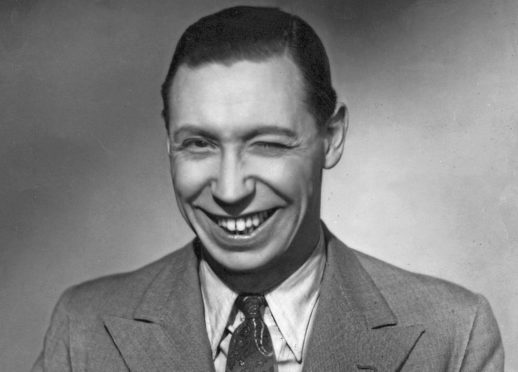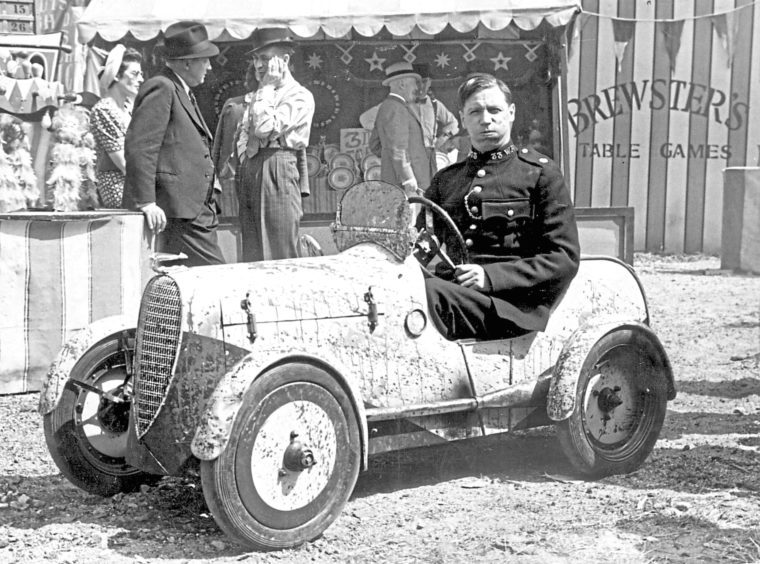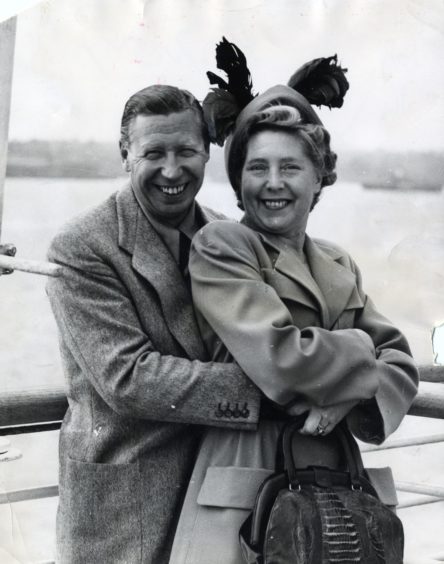
Ukulele in hand, he kept our chins up and smiles on our faces through the darkest days – there has never been another star like George Formby.
Born George Hoy Booth in Wigan in 1904, Formby would follow his father, George Sr, into music hall, basing his jokes, songs and character on those of his dad, who died when George was just 16.
His father had made jokes about his own ill health, and George Jr also had a troubled beginning to life. He was born blind due to a caul, a rare membrane over newborns’ faces.
A coughing fit after several months gave the baby his sight.
By seven years old the diminutive George was taken from school, unable to read or write, and looked set for a career as a stable boy and jockey.
His dad even sent him away, so worried was he that the boy would follow his stage career – “One fool in the family is enough” – but when the younger George began entertaining, he was a sensation.
TV star Frank Skinner is a huge fan of Formby and the ukulele, and reckons Andy Eastwood is “George Formby’s greatest music heir”, even featuring him in a TV interview and ukulele duet.
Now Andy is planning to take his amazing Spirit Of The Blitz show on the road, regaling audiences with his astounding mastery of the ukulele – he plays one that belonged to Formby – and reminding us of what a legend Formby really was.
“Frank originally did a George Formby programme and I was worried he might be taking the mickey a bit. But no, he absolutely loves him to bits!” says Andy, born in Lancashire to a musical family himself, and so good on his chosen instrument that he became the first musician ever to give his degree recital on the uke.
“I think George Formby’s warmth and courage are what still make him popular. He was ahead of his time, because he was the ordinary chap next door. In the 1930s they were making those very glamorous films, and he was the complete antithesis.
“He was the ordinary working-class lad from Lancashire, not particularly good-looking but friendly, and he played the underdog. That just resonated with people, and he was a kind of working-class hero.
“I think people still get that. He was unique. I suppose you could say the Frank Spencer sort of character, or Norman Wisdom, were a bit like him, and today I suppose Joe Pasquale would be the nearest we’ve got.
“He was just silly, completely unthreatening, but very, very warm. Before him, his father would be his first influence,” adds Andy.
“But he also liked the American jazz coming in at that time, so he added the ukulele to all that and it created a new version of the old music hall characters.”
Andy has worked with everyone from Des O’Connor to Max Bygraves, Roy Hudd, Joe Pasquale and Danny La Rue. But he reckons a certain gent hailing from Knotty Ash was his main mentor.
“My grandad brought me up listening to the old variety songs, and I’ve always loved that era and the vaudeville style,” he says. “But I thought I had missed it all as I grew up.
“Luckily, though, I caught the tail end, getting to work with Max Bygraves when I was a kid. I got on the Danny La Rue Show when I was 22.
“The big one for me was getting in with the Ken Dodd Show. I did it for 16 years and I learned things every day from a master. Where else could you learn?
“I got to work with these people who had worked with George Formby, and it is like traditions being passed on, how to work an audience, how to present your material.
“It was like going back to college, and I soaked it up like a sponge because I knew how lucky I was to get all that. It would be very nice for young people to come and we can carry on the traditions.”
How did he get Formby’s ukulele, an instrument that must be priceless?
“The guy who had it used to let me play it and, when he passed away, his wife gave it to me,” says Andy. “He wanted it to be used, you know?
“George had several ukuleles. George Harrison had one, Brian May of Queen has one. Many are in private collections, a couple in museums. Paul McCartney has one.
“Mine is the only one that is used on stage these days, and I guess it’s worth a fortune though I don’t think of it in monetary terms. It’s a piece of treasure, and when I play it and think the great man’s fingers were on those strings, it’s quite a thing!”
George Formby’s special brand of musical magic wasn’t confined to Wigan and surrounds. Posh Londoners and working-class Glaswegians were equally enthralled by the great man.
“He was popular absolutely everywhere,” Andy points out. “In those days the big variety theatres had a circuit, with big theatres in every city.
“So George worked the whole thing, Glasgow, Edinburgh, everywhere.
“And in the war, of course, he went up to all the garrison theatres for the troops up there.
“It’s interesting that he was one of the few real true Lancashire comedians, along with Gracie Fields, that could break through to London’s West End. He did top the bill at the Palladium for the first time in 1938, having done the Royal Variety Show the year before.
“He also went back there after the war. He did pantomime in the West End, he did a 1951 musical at the Palace Theatre, the hottest ticket in London.
“I’m sure they viewed him with a chuckle and thought he was silly, but that’s fine because they still kept piling in to see him.
“You know, the royal family used to command him to perform at Windsor Castle.
“He seemed to just cross over and appeal to everyone.”
For all these reasons and more, Spirit Of The Blitz promises to be an emotional, funny night out at today’s modern theatres.
“People can expect a feelgood, uplifting show to bring back some memories,” Andy reveals. “On the surface it’s a nostalgic, good-time singalong, but of course it works on other levels as well.
“There’s the remembrance aspect. When you think of the Festival of Remembrance in November it’s quite a solemn occasion but they also have little interludes of music and things people can enjoy.
“Well, Spirit Of The Blitz is like having two hours of those musical and other interludes. We don’t dwell on the sadness of it, because the point is that the entertainment in those times was so uplifting.
“It had to be optimistic to get people through those terrible times, so we celebrate the songs, the stars and the spirit of optimism. These were people who could go into the air raid shelter at night and when they came out in the morning their street wasn’t there any more.”
George Formby was one of the few people who could keep us going even then.

Enjoy the convenience of having The Sunday Post delivered as a digital ePaper straight to your smartphone, tablet or computer.
Subscribe for only £5.49 a month and enjoy all the benefits of the printed paper as a digital replica.
Subscribe © Moviestore/Shutterstock
© Moviestore/Shutterstock 